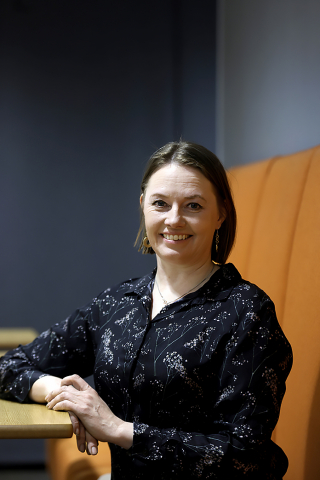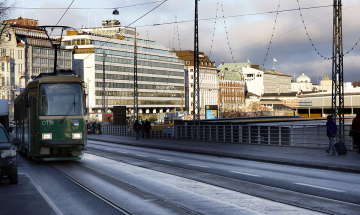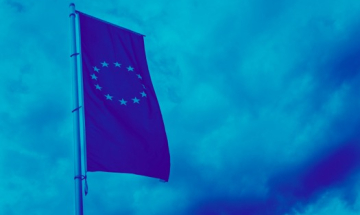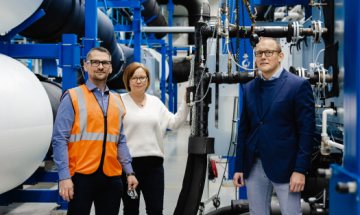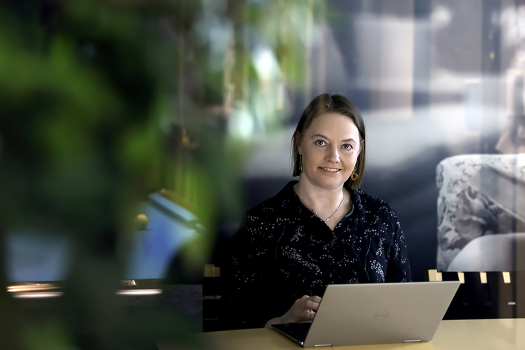
Gofore is building a more ethical digital world – “Building carbon-neutral software is part of coders’ professional pride and core skills”
“In ethical digitalisation, it is good to remember the saying that ‘fire makes a good servant but a bad master’. Technology is neutral in itself – neither good nor evil. It is people who decide how it is used,” says Gofore’s Chief Sustainability Officer Kristiina Härkönen.
In the coming years, we will increasingly see digitalisation seeping into all areas of human life. From the sustainable development perspective, it is important that low-emission solutions and ethical values become more widely established in the digitalisation field.
“If we are to build an ethical world, this must also include an ethical digital world,” Härkönen points out.
In Härkönen’s view, such ethical digitalisation is one that takes into account key values: enabling a good and fair life for people, animals, nature and future generations and ensuring well-functioning institutions and structures and ethical responsibility.
“The mission statement of our company is ‘pioneering an ethical digital world’. Taking a pioneering approach requires a certain humility. We don’t have ready-made answers – indeed, such answers are probably never even possible when it comes to questions of ethics. We seek to find the right paths forward and to clear the way ahead.”
- Gofore: Employer Brand of the Year and Finland’s Best Workplace
-
- Gofore is a Tampere-based software company
- Chosen as Employer Brand of the Year at the 2021 Recruitment Gala
- Established in 2001
- Over 1000 employees across 12 offices in four European countries
- Turnover reached €104.5 million in 2021
- Strong growth over recent years from company acquisitions
- Chosen as Finland’s best workplace and Europe’s second best in 2017 (Great Place to Work)
These days, Gofore has more clout for pushing forward the cause of ethical digitalisation. The business has grown over recent years to become an international company with more than a thousand employees.
COMMODORE GEEKS WERE GREEN CODING PIONEERS!
When computing became a popular hobby in the 1980s, the computers available still had little processing power, so coders competed over who could best optimise their code and thus get as much out of the computer as possible. Were these ‘Commodore geeks’ green coding pioneers?
“Certainly they were,” Härkönen says with a laugh.
“I myself began coding at the age of eight on a Commodore computer, and my first job with Gofore, when I began in 2003, was as a coder.”
It started with a Commodore. “I myself began coding at the age of eight on a Commodore computer.”
Green coding is about finding ways to increase the energy efficiency of digitalisation. It is a method for coders to reduce CO2 emissions in their coding work.
Green or carbon-neutral digitalisation, meanwhile, is something that starts before the coding phase – it begins with planning and service design.
Härkönen wants to see the same kind of climate impact assessments being made for software projects as are currently applied in the construction sector. This would make it possible to assess how much a system’s use would cut emissions elsewhere and, on the other hand, how much emissions it would produce.
THE CHALLENGE OF CHEAP ENERGY
There are opportunities to significantly cut emissions and energy use through digitalisation and data management techniques. Even a single Google search consumes electricity, however, so is digitalisation and data management really just a case of shifting the energy problem elsewhere?
“At its worst, it can be just that, but I firmly believe that the net effect is strongly positive.”
For Härkönen, it is important to think about where and how to make use of digitalisation and data and to examine its net impact.
"In general, these digital options use less resources. Everyone has seen in their everyday lives, for example, how digitalisation has reduced the use of paper, printing and mailing over the last 10–20 years,” Härkönen points out.
The energy transition will massively increase electricity consumption. Härkönen believes, however, that genuine reductions in the electricity consumption of digital software can be achieved. Indeed, that is already the direction we are heading in.
Genuine reductions in the electricity consumption of digital software can be achieved. Indeed, that is already the direction we are heading in.
“All platforms pay attention to resource efficiency. Services are becoming more and more efficient.”
Härkönen sees the cheap price of energy as one challenge for sustainable development.
“Energy has been reasonably cheap, and continues to be so despite the price increases. This situation has led to the development of unnecessary, capacity-consuming data collection and analytics. But it is also possible to develop very resource-efficient software. Indeed, this is an integral part of coders’ professional pride and core skills,” she adds.
The problem is that some of the customers purchasing software development are not particularly interested in optimising the software. After all, this may require additional, and expensive, working hours – which are then weighed up against the cheaply available energy.
GREEN CODING AS PART OF PROCUREMENT CRITERIA?
In Härkonen’s view, Finland has taken a leading position in green coding, but there has been more talk than action. She considers that companies are already doing quite a lot, but cost issues often become a barrier. In this context, she sees an opportunity for the public sector to set an example.
“I would like to see green coding included in procurement criteria in a similar way to data security guidelines. Right from the start of a project, the net impact of green coding on CO2 emissions could be thought through.”
If a large public body were to make this change, it would have a significant impact.
“It would get other companies thinking. A certain project may require a few more work hours in order to calculate the life-cycle emissions, but people would be more ready to make the investment.”
At Gofore for 20 years. 'I have been a coder, project manager, salesperson, business director and consultant. With such a variety of roles over the years, I’ve had no need to change employee.”
In Finland, Härkönen knows of only a few such cases. In Estonia, Gofore has calculated the lifecycle emissions of one software project.
“With all the predictions of continual growth in digital services, something must be done. The current approach is not sustainable development,” she emphasises.
In Härkönen’s opinion, the carbon footprint is a good place to start. It is a simple indicator that can be monitored.
There have already been successful attempts to reduce CO2 emissions by implementing carbon neutral cloud services. Härkönen also thinks it is worth thinking about whether we really need to be using images and videos everywhere as much as we currently go.
In addition, private individuals could avoid storing so much data ‘just in case’ or amassing huge amounts of photos. At the very least, these data masses could be moved from cloud services to some kind of archive, Härkönen suggests.
CARBON-NEUTRAL ELECTRICITY AND COMPENSATION
Last year, Gofore reached its carbon neutrality objective. Now the company is seeking out ways to further reduce its emissions. According to Härkönen, all the easy changes have already been made.
“We use carbon-neutral electricity. It is quite impossible to achieve completely zero emissions, so we have to compensate for some emissions. In 2020, we did this through Hiilipörssi by contributing towards marsh restoration work.”
Text: Marjo Vuorinen
Photos: Liisa Takala
For further reading:
The circular economy is a part of everyday business for crane manufacturer Konecranes: “The circular economy is more than just a competitive asset, it is the only way forward”
Technology Industries of Finland’s corporate responsibility policy: responsibility is the foundation of successful business
